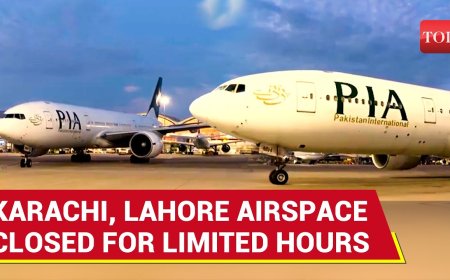Will the Air India Crash Lead to the Grounding of the Dreamliner Series and Disrupt Travel?
The recent Air India Dreamliner crash raises safety concerns. Could this lead to a global grounding of the Boeing 787 series and major travel disruptions? Here's what experts and analysts say.

Aviation Shock: Dreamliner Safety Under Scrutiny Following Air India Incident
The recent Air India crash involving a Boeing 787 Dreamliner has reignited concerns over the safety of the wide-body aircraft and raised critical questions about the future of the Dreamliner fleet worldwide. Although investigations are still in their preliminary stages, regulators, airlines, and travelers alike are watching closely, wondering whether the incident could lead to widespread grounding of the 787 series — a move that could significantly disrupt global air travel.
Incident Summary: What Happened?
On June 10, Air India Flight AI-187, a Boeing 787-8 Dreamliner en route from Delhi to Toronto, crash-landed shortly after takeoff due to what preliminary reports suggest may have been a catastrophic failure in the aircraft’s electrical power system. Though all 212 passengers and crew survived with minor injuries, the incident has prompted the Directorate General of Civil Aviation (DGCA) and international aviation regulators to begin thorough technical reviews.
Initial statements from Air India and Boeing have acknowledged the occurrence but have refrained from assigning fault pending detailed analysis. The U.S. National Transportation Safety Board (NTSB) is also cooperating, given Boeing's American origin.
Dreamliner Series: Past Safety Hiccups and Current Usage
This isn’t the first time the Dreamliner series — celebrated for its fuel efficiency, composite materials, and advanced avionics — has drawn scrutiny. In 2013, a global grounding followed incidents of battery fires aboard several 787s, leading to months-long investigations and retrofits.
Today, Boeing’s Dreamliner fleet is a workhorse of long-haul routes for carriers like Air India, British Airways, Qatar Airways, and United Airlines. With over 1,100 Dreamliners in service globally, any decision to ground the fleet, even partially, would affect thousands of international flights weekly.
Regulatory Response: A Wait-and-Watch Mode
In the aftermath of the Air India incident, the DGCA has ordered detailed inspections of all Dreamliner aircraft in Indian service, with a specific focus on electrical systems. However, no blanket grounding order has been issued as of now.
An FAA official, speaking on condition of anonymity, stated, “There is no immediate evidence that this is a systemic issue requiring a global grounding. But we are monitoring the situation very closely.”
Analyst Perspectives: Is Grounding Likely?
Aviation analyst Kapil Kaul, CEO of CAPA India, noted, “The Dreamliner is a complex aircraft, and while it has had issues in the past, a single incident — unless traced back to a design flaw — is unlikely to trigger mass groundings.”
He added, “If the investigation points to a manufacturing defect or software glitch that’s common across the fleet, then yes, a temporary suspension of flights could be on the table.”
On the other hand, safety consultant Diana Johnson from AeroGuard Compliance suggested that in the current climate of heightened airline accountability, regulators might err on the side of caution. “Given the aircraft's history and the political scrutiny Boeing faces post-MAX crises, even a minor fault may be grounds for at least a phased grounding,” she said.
Impact on Global Air Travel and India’s Aviation Sector
Should a partial or full grounding occur, the ripple effects on air travel would be immediate and significant. International carriers rely on the 787s for key transatlantic and transpacific routes due to their range and efficiency.
For Air India, the implications could be more severe. The airline operates nearly 30 Dreamliners — a substantial portion of its long-haul fleet. Disruptions could lead to flight cancellations, schedule reshuffles, and an erosion of passenger trust just as the airline undergoes a transformation under the Tata Group’s leadership.
Travel industry expert Meenal Shah commented, “India's outbound summer travel season is peaking. If Dreamliners are grounded, it’s not just Air India — but also Vistara, and possibly even connecting international carriers — that will face severe pressure to rebook or reroute passengers.”
Boeing’s Stake and Market Reactions
Boeing, already reeling from earlier safety crises, saw its stock dip 3.4% intraday following news of the crash. Investors are worried that even a perception of unreliability in its second-most important aircraft line could hurt future sales and lead to new legal or regulatory entanglements.
“Boeing has just started rebuilding trust post-MAX,” said analyst Richard Stone of Raymond James. “Another Dreamliner issue could not only stall deliveries but also prompt airlines to rethink future purchases.”
Meanwhile, Airbus shares saw a slight uptick, as investors speculated that long-haul orders could potentially shift toward the A350 series if airlines choose to diversify away from Boeing.
Investor Outlook: Volatility Expected
The coming weeks will be crucial for aviation sector stocks, airline planning, and manufacturer reputations. Investors should brace for volatility as more details emerge.
Short-term disruptions could hurt airline margins, especially for carriers with limited backup capacity. Long-term impacts, however, will depend entirely on whether this is viewed as an isolated mechanical anomaly or part of a larger design issue.
As investigators piece together the cause of the crash, the aviation world is holding its breath. Grounding decisions will hinge on facts — not fear — but the historical precedent and public sensitivity around Boeing aircraft mean regulators will act swiftly if any pattern emerges.
Until then, both flyers and financiers will have to stay buckled in for a turbulent ride.
What's Your Reaction?
 Like
0
Like
0
 Dislike
0
Dislike
0
 Love
0
Love
0
 Funny
0
Funny
0
 Angry
0
Angry
0
 Sad
0
Sad
0
 Wow
0
Wow
0













































































